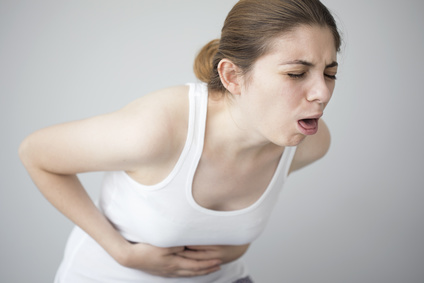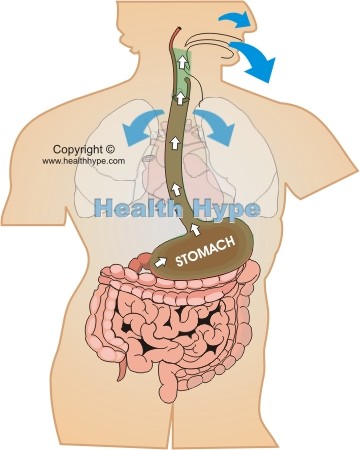Clear Fluid and Mucus Vomit – Causes of Colorless Vomiting
Vomiting is a forceful expulsion of the upper gastrointestinal contents. This is the food, fluid and secretions in the esophagus, stomach and the first part of the small intestine known as the duodenum. Less commonly the contents within the middle and end portions of the small intestine, jejunum and ileum, may also be propelled up the gut and expelled through the mouth.
Normally muscles in the gut wall contraction in a coordinated manner to push food downwards – from mouth to the rectum. This is known as peristalsis. When vomiting, the direction of coordinated muscle contraction is reversed thereby pushing the gut contents upwards to the mouth – antiperistalsis. It is much more forceful that the contractions in peristalsis. Therefore the gut contents are expelled forcefully.

Normal Vomitus Composition
Usually the vomitus (contents that are vomited out) contains a combination of :
- Food – whole, chewed or partially digested.
- Fluids that were recently consumed.
- Mucus secreted from the digestive tract wall.
- Water from the gut wall.
- Digestive enzymes from the gut wall and glands.
- Bile from the gallbladder secreted into the duodenum.
What is the clear fluid and mucus in vomit?
Vomiting at first empties a combination of all the contents mentioned above under normal vomitus. Once it continues, the food and fluid recently consumed may be totally expelled and the gut is essentially empty. Only digestive enzymes, mucus and bile may remain.
Bile vomit is typically yellow in color and masks the digestive enzymes and mucus. However, once the bile is completely evacuated, all that remains is the digestive tract secretions. This includes the mucus, digestive enzymes and stomach acid, and water secreted into the gut. Sometimes the mucus may originate from the airways and empty out with the rest of the vomitus but is usually not of a large volume.
All of these secretions are typically clear in color, even the stomach acid. Therefore a person who is passing out clear fluid and mucus as vomit does so for one of two reasons :
- all the food, fluid and bile has been passed out – clear fluid and mucus seen after repeated vomiting.
- having not eaten for long periods of time prior to vomiting – clear fluid and mucus seen even with vomiting just once.
Vomiting can be acute or chronic.
Acute Vomiting
Acute vomiting is sudden and intense for a short period of time – hours or days. Typically the upper gut is severely irritated and sensitive and food is therefore not well tolerated. In some instances, eating a small morsel of food triggers repetitive vomiting which continues even after the food and most of the digestive secretions are expelled from the gut. Then all the residual mucus and digestive juices are expelled. However, the repetitive vomiting eventually leads to no vomitus being passed out as the upper gut is totally empty, even of most of its own mucus and digestive juices.
Chronic Vomiting
In chronic cases, there is persistent vomiting but it is not always as severe. It may occur as episodes that recur within hours or days rather than the hours and sometimes even minutes as is seen in acute vomiting. Chronic vomiting should always be considered as a serious symptom and investigated immediately. Nausea may at times be absent. Food and drink may not be as significant a trigger as is the case with acute vomiting. Therefore a person may vomit even on an empty stomach.
Causes of Clear Fluid and Mucus Vomiting
The various causes of vomiting, both acute and chronic, usually involves the following factors:
- physiological
- diet
- medication
- diseases
Physiological causes
There are several causes of vomiting which are not related to diseases or the infection of irritant substances. It is therefore considered to be physiological causes of vomiting.
- Pregnancy. The high levels of certain hormones during pregnancy may stimulate the vomiting center in the brain.
- Motion sickness triggered by the sensation of motion from the inner ear without the concomitant signals from the other senses to the brain.
- Strenous physical activity particularly when a person is not accustomed to it may lead to vomiting.
- Pressure on the abdomen or hanging upside down especially after eating a large meal although this is more likely to cause regurgitation rather than vomiting.
Food and Diet
Dietary causes of vomiting are largely due to intolerance and malabsorption. The problem with the breakdown or absorption of the nutrients are more likely to cause diarrhea but sometimes there may be nausea which can trigger vomiting.
- Lactose intolerance – milk, dairy products
- Celiac disease – gluten (wheat)
- Fructose malabsorption – fruits
- Sorbitol malabsorption – artificial sweeteners, diet drinks
Overeating may lead to regurgitation and in extreme cases even vomiting. Severe hunger may trigger nausea and sometimes vomiting can occur as well. Certain foods may have toxic substances or are irritants to the upper gut which can lead to vomiting. This may be dependent on the quantity ingested and type or species of the animal or plant. It includes :
- Mushrooms
- Oils like castor oil
- Fish (scombrotoxic, ciguatera fish poisoning or paralytic shellfish toxin)
Ingesting inedible substances, such as sand or chalk, seen with pica may also lead to vomiting.

Medication
Certain medication can irritate the upper gut or stimulate the chemoreceptor trigger zone in the brain thereby causing vomiting. This includes :
- Antibiotics
- Certain types of antacids
- Cytotoxic agents – chemotherapy for cancers
- Laxatives
- Narcotic drugs
- NSAIDs
- Proton pump inhibitors (PPIs)
Diseases
Vomiting is a sign of several diseases including :
- Bowel obstruction – blockage of the small or large intestine.
- Cyclic vomiting syndrome – idiopathic.
- Diabetic ketoacidosis.
- Eating disorders.
- Food poisoning.
- Gastroenteritis (stomach flu).
- Hepatitis (liver inflammation).
- Kidney failure.
- Pancreatitis (pancreas inflammation).
- Severe pain of any origin.
- Traumatic head injury.
- Uremia (high urate levels in blood).
Poisoning
Toxic substances may cause vomiting as it irritates the gut and the body may also initiate vomiting as a means of expelling the toxin from the gut. Some of the toxins found in foods has been discussed above. Other forms of poisoning includes :
- Heavy metal poisoning
- Bites and stings from spiders, snakes or insects
- Nicotine – particularly the excessive use of nicotine replacement products
- Alcohol
- Chlorinated water (swimming pools)
- Radiation exposure
- Plant toxins (inedible plants)





